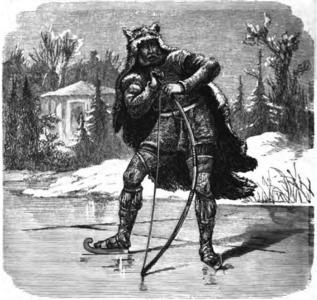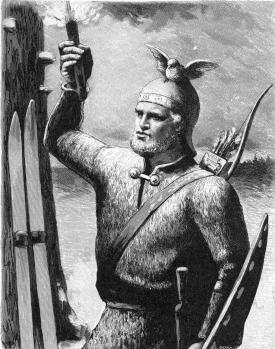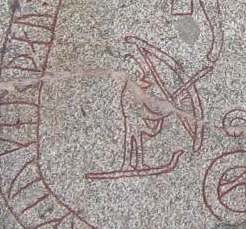("Glory" in Old Norse)

Ullr
is a very old god of the northern lands, so old that by the time the
Iron Age Norse myths were written down, not much more was known about
him except that he was a god of archery, hunting, and the winter. His
name occurs so frequently as part of Scandinavian place-names that he
must have been a much more important deity at one time. He was shown
frequently with skates or skis on his feet, and because of this he has
been hailed as the modern God of Skiing. One story talks about him
"crossing water on a magic bone", alluding to crossing the frozen ice on
skates. He was also called God of the Shield, and the shield was
referred to as his "ship", which may be a reference to using a shield or
shield-shaped board as a sled … or to the ice of winter enveloping the
world like a shield.
Ullr's name comes from wuldor, an Old High German word meaning
"glory". It was pronounced "Ool" in ancient times, but today is
generally pronounced "Ooler". In Germany he was known as Holler and said to be the husband
of the Germanic goddess Holda.

Ullr
was said to be the son of Sif and the stepson of Thor. Some claim that
he was the son of Egill/Aurvandil, the great archer who was Thor's
hunting companion and the father of Svipdag as well. Some see him as
Aesir because of his mother and stepfather; some as Vanir because of his
food-procuring hunter's nature. He lived in Ydalir, the Yew-grove,
referring to the fact that yew wood was the favorite for making bows
even thousands of years ago. In Saxo Grammaticus's works, where the Gods
are recast as human heroes, Odin is temporarily exiled for rape and
Ullr is chosen to lead in his place until Odin's return, which is an
echo of his former importance to the people of the North.
In Lilla Ullevi, Sweden, an actual shrine
to Ullr was unearthed. In the earth around it were found 65 rings; old
references to swearing on Ullr's ring indicate that he was one of the
Gods who watched over a vow. The rings were apparently used for swearing
oaths and then buried at his shrine.
In modern times, Ullr has seen a great
surge in popularity as the official God of Skiing. First he was unearthed as
such earlier in the century in northern Europe, where little amulet necklaces
with his skiing figure on them were given out as gifts and good-luck charms for
skiers. Then the Ullr custom spread to America, where he has been taken as the
patron of various winter sports and winter hunting organizations, including a
major festival – Ullr Fest – in Breckenridge, Colorado, and sacrificial
bonfires to Ullr in Utah and other states (burning old worn-out skis and sleds)
to bring the snow. He now has numerous amulets, sigils, organizations, and even
liquor named after him. Ullr may currently be the Norse god most called upon
and invoked today by people who don’t consider themselves to be Pagans or
Heathens.
 Poetic Edda
Poetic Edda
Ullr is mentioned in the poem
Grímnismál where the homes of individual gods are recounted.
- Ýdalir heita
- þar er Ullr hefir
- sér of görva sali.
|
- Ydalir it is called,
- where Ullr has
- himself a dwelling made.– Thorpe's translation
|
The name
Ýdalir, meaning "yew dales", is not otherwise attested. The yew was an important material in the making of bows, and the word
ýr, "yew", is often used metonymically to refer to bows. It seems likely that the name
Ýdalir is connected with the idea of Ullr as a bow-god.
Another strophe in
Grímnismál also mentions Ullr.
- Ullar hylli
- hefr ok allra goða
- hverr er tekr fyrstr á funa,
- því at opnir heimar
- verða of ása sonum,
- þá er hefja af hvera.
|
- Ullr’s and all the gods’
- favour shall have,
- whoever first shall look to the fire;
- for open will the dwelling be,
- to the Æsir's sons,
- when the kettles are lifted off.– Thorpe's translation
|
The strophe is obscure but may refer to some sort of religious ceremony (possibly fire scrying). It indicates Ullr as an important god.
The last reference to Ullr in the
Poetic Edda is found in
Atlakviða:
- Svá gangi þér, Atli,
- sem þú við Gunnar áttir
- eiða oft of svarða
- ok ár of nefnda,
- at sól inni suðrhöllu
- ok at Sigtýs bergi,
- hölkvi hvílbeðjar
- ok at hringi Ullar.
|
- So be it with thee, Atli!
- as toward Gunnar thou hast held
- the oft-sworn oaths,
- formerly taken -
- by the southward verging sun,
- and by Sigtý’s hill,
- the secluded bed of rest,
- and by Ullr’s ring.– Thorpe's translation
|
Both
Atlakviða and
Grímnismál are often considered to
be among the oldest extant Eddic poems. It may not be a coincidence that
they are the only ones to refer to Ullr. Again we seem to find Ullr
associated with some sort of ceremony, this time that of swearing an
oath by a ring, a practice associated with Thor in later sources. During
an excavation in 2007, of a Vendel era shrine for Ullr north of Stockholm, many symbolic rings were discovered and which are considered to represent Ullr's ring.
Prose Edda
In chapter 31 of
Gylfaginning in the Prose Edda, written in the 13th century by Snorri Sturluson, Ullr is referred to as a son of Sif (with a father unrecorded in surviving sources) and as a stepson of Sif's husband Thor:
- Ullr heitir einn, sonr Sifjar, stjúpsonr Þórs. Hann er bogmaðr svá
góðr ok skíðfœrr svá at engi má við hann keppask. Hann er ok fagr álitum
ok hefir hermanns atgervi. Á hann er ok gott at heita í einvígi.
|
- Ullr, Sif's son and Thór's stepson, is one [too]. He is such a good
archer and ski-runner that no one can rival him. He is beautiful to look
at as well and he has all the characteristics of a warrior. It is also
good to call on him in duels.– Young's translation
|
|
In
Skáldskaparmál, the second part of the Prose Edda, Snorri mentions Ullr again in a discussion of kennings.
Snorri informs his readers that Ullr can be called ski-god, bow-god,
hunting-god and shield-god. In turn a shield can be called Ullr's ship.
Despite these tantalising tidbits Snorri relates no myths about Ullr. It
seems likely that he didn't know any, the god having faded from memory.
Popular reception
The town of Breckenridge, Colorado
hosts a week-long festival called "Ullr Fest" each year in January,
featuring numerous events designed to win his favor in an effort to
bring snow to the historic ski town. Breck Ullr Fest was first held in
1962.
 Archaeological record
Archaeological record
Thorsberg chape
The
Thorsberg chape (a metal piece belonging to a scabbard found in the
Thorsberg moor) bears an Elder Futhark inscription, one of the earliest
known altogether, dating to roughly AD 200.
owlþuþewaz / niwajmariz
The first element
owlþu, for
wolþu-, means "glory", "glorious one", Old Norse
Ullr, Old English
wuldor. The second element,
-þewaz,
means "slave, servant". The whole compound is a personal name or title,
"servant of the glorious one", "servant/priest of Ullr".
Niwajmariz means "well-honored".
Lilla Ullevi
In Lilla Ullevi ("little shrine of Ullr")
north of Stockholm archaeologists excavated during 2007 the site of a
religious worshiping ground for Ullr (from 500 to 800 AD).
The well-preserved state of the shrine may be unique in Scandinavia: it
was shaped like a platform with two "arms" of rocks having four erected
poles in front of it where there was probably a wooden platform. Moreover, the archaeologists found 65 "amulet rings" in the area; rings are reported to have been used when people swore oaths. They may be the rings of Ullr that are referred to in the eddic poem
Atlakviða.
 Ullr
is a very old god of the northern lands, so old that by the time the
Iron Age Norse myths were written down, not much more was known about
him except that he was a god of archery, hunting, and the winter. His
name occurs so frequently as part of Scandinavian place-names that he
must have been a much more important deity at one time. He was shown
frequently with skates or skis on his feet, and because of this he has
been hailed as the modern God of Skiing. One story talks about him
"crossing water on a magic bone", alluding to crossing the frozen ice on
skates. He was also called God of the Shield, and the shield was
referred to as his "ship", which may be a reference to using a shield or
shield-shaped board as a sled … or to the ice of winter enveloping the
world like a shield.
Ullr
is a very old god of the northern lands, so old that by the time the
Iron Age Norse myths were written down, not much more was known about
him except that he was a god of archery, hunting, and the winter. His
name occurs so frequently as part of Scandinavian place-names that he
must have been a much more important deity at one time. He was shown
frequently with skates or skis on his feet, and because of this he has
been hailed as the modern God of Skiing. One story talks about him
"crossing water on a magic bone", alluding to crossing the frozen ice on
skates. He was also called God of the Shield, and the shield was
referred to as his "ship", which may be a reference to using a shield or
shield-shaped board as a sled … or to the ice of winter enveloping the
world like a shield.
 Ullr
was said to be the son of Sif and the stepson of Thor. Some claim that
he was the son of Egill/Aurvandil, the great archer who was Thor's
hunting companion and the father of Svipdag as well. Some see him as
Aesir because of his mother and stepfather; some as Vanir because of his
food-procuring hunter's nature. He lived in Ydalir, the Yew-grove,
referring to the fact that yew wood was the favorite for making bows
even thousands of years ago. In Saxo Grammaticus's works, where the Gods
are recast as human heroes, Odin is temporarily exiled for rape and
Ullr is chosen to lead in his place until Odin's return, which is an
echo of his former importance to the people of the North.
Ullr
was said to be the son of Sif and the stepson of Thor. Some claim that
he was the son of Egill/Aurvandil, the great archer who was Thor's
hunting companion and the father of Svipdag as well. Some see him as
Aesir because of his mother and stepfather; some as Vanir because of his
food-procuring hunter's nature. He lived in Ydalir, the Yew-grove,
referring to the fact that yew wood was the favorite for making bows
even thousands of years ago. In Saxo Grammaticus's works, where the Gods
are recast as human heroes, Odin is temporarily exiled for rape and
Ullr is chosen to lead in his place until Odin's return, which is an
echo of his former importance to the people of the North.
 Ullr
is a very old god of the northern lands, so old that by the time the
Iron Age Norse myths were written down, not much more was known about
him except that he was a god of archery, hunting, and the winter. His
name occurs so frequently as part of Scandinavian place-names that he
must have been a much more important deity at one time. He was shown
frequently with skates or skis on his feet, and because of this he has
been hailed as the modern God of Skiing. One story talks about him
"crossing water on a magic bone", alluding to crossing the frozen ice on
skates. He was also called God of the Shield, and the shield was
referred to as his "ship", which may be a reference to using a shield or
shield-shaped board as a sled … or to the ice of winter enveloping the
world like a shield.
Ullr
is a very old god of the northern lands, so old that by the time the
Iron Age Norse myths were written down, not much more was known about
him except that he was a god of archery, hunting, and the winter. His
name occurs so frequently as part of Scandinavian place-names that he
must have been a much more important deity at one time. He was shown
frequently with skates or skis on his feet, and because of this he has
been hailed as the modern God of Skiing. One story talks about him
"crossing water on a magic bone", alluding to crossing the frozen ice on
skates. He was also called God of the Shield, and the shield was
referred to as his "ship", which may be a reference to using a shield or
shield-shaped board as a sled … or to the ice of winter enveloping the
world like a shield.
 Ullr
was said to be the son of Sif and the stepson of Thor. Some claim that
he was the son of Egill/Aurvandil, the great archer who was Thor's
hunting companion and the father of Svipdag as well. Some see him as
Aesir because of his mother and stepfather; some as Vanir because of his
food-procuring hunter's nature. He lived in Ydalir, the Yew-grove,
referring to the fact that yew wood was the favorite for making bows
even thousands of years ago. In Saxo Grammaticus's works, where the Gods
are recast as human heroes, Odin is temporarily exiled for rape and
Ullr is chosen to lead in his place until Odin's return, which is an
echo of his former importance to the people of the North.
Ullr
was said to be the son of Sif and the stepson of Thor. Some claim that
he was the son of Egill/Aurvandil, the great archer who was Thor's
hunting companion and the father of Svipdag as well. Some see him as
Aesir because of his mother and stepfather; some as Vanir because of his
food-procuring hunter's nature. He lived in Ydalir, the Yew-grove,
referring to the fact that yew wood was the favorite for making bows
even thousands of years ago. In Saxo Grammaticus's works, where the Gods
are recast as human heroes, Odin is temporarily exiled for rape and
Ullr is chosen to lead in his place until Odin's return, which is an
echo of his former importance to the people of the North.
 Poetic Edda
Poetic Edda Archaeological record
Archaeological record